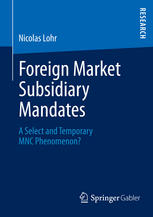

Most ebook files are in PDF format, so you can easily read them using various software such as Foxit Reader or directly on the Google Chrome browser.
Some ebook files are released by publishers in other formats such as .awz, .mobi, .epub, .fb2, etc. You may need to install specific software to read these formats on mobile/PC, such as Calibre.
Please read the tutorial at this link: https://ebookbell.com/faq
We offer FREE conversion to the popular formats you request; however, this may take some time. Therefore, right after payment, please email us, and we will try to provide the service as quickly as possible.
For some exceptional file formats or broken links (if any), please refrain from opening any disputes. Instead, email us first, and we will try to assist within a maximum of 6 hours.
EbookBell Team

0.0
0 reviewsThis book investigates how foreign subsidiaries of multinational corporations expand their presence and functional scope into foreign territories. It thereby focuses on how cross-border subsidiary mandates are obtained and how they develop over time. Multiple case-studies based on in-depth interviews with HQ and subsidiary management suggest that subsidiary internationalization represents a select MNC phenomenon and that associated foreign market mandates are only of temporary nature. Foreign subsidiaries appear to receive cross-border responsibility if their value proposition for overcoming liability of inter-regional foreignness is capable of more than offsetting any risk increase that stems from principal-agent relationships between corporate headquarters and foreign subsidiaries. Following the initial mandate gain, the subsidiary’s restrained access to HQ-like functions, intra-MNC competition and altering localization degrees in the market covered by the mandate puts the sustainability of cross-border responsibilities at risk. As a consequence, internationalization trajectories of foreign subsidiaries often follow discontinuous rather than gradual evolutionary paths. In addition, cross-border subsidiary mandates often appear to be predefined and temporary in nature. They might actually have a limited life span from their very conception.